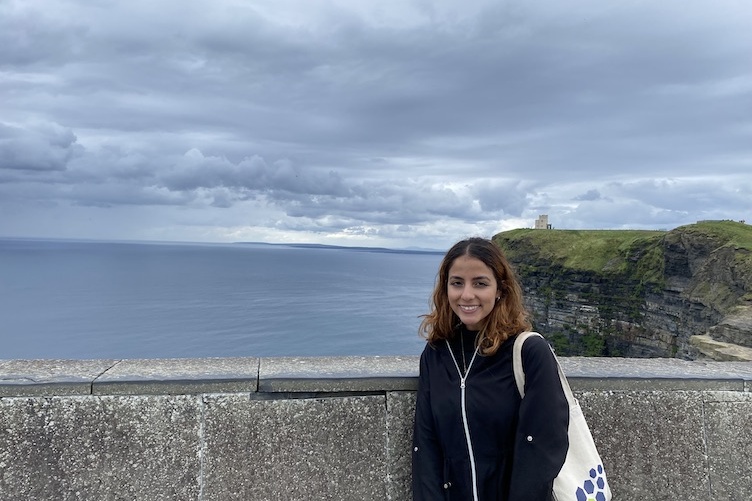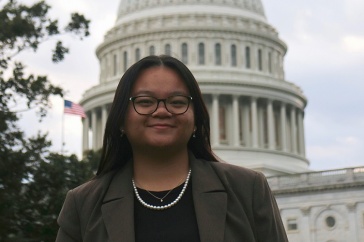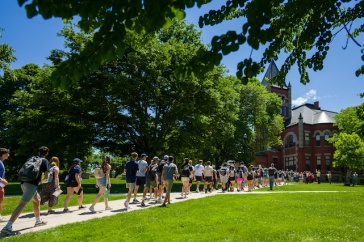
Lina Adjout ’21 at the Cliffs of Moher in Munster, a province in the south of Ireland.
It took Lina Adjout ’21 one day and one traditional Turkish pastry to find exactly what she was hoping to find in Ireland.
Adjout embarked on the journey as a recipient of the Stanley A. Hamel Traveling Fellowship (HTF) in hopes of discovering the “emerging immigrant diaspora,” as she explains. Less than 24 hours after arriving in Dublin, she struck up a conversation with a Turkish shop owner – over a börek, a pastry popular in the Balkans, the Middle East and Central Asia that sparked memories of Adjout’s own Algerian roots – about their shared immigrant history.
“He spoke about his own immigrant story of coming to Ireland with his young children to escape political unrest and an unpromising economic future, emphasizing that it was important for him to hold onto his Turkish identity while also trying to fit into a completely new society,” Adjout wrote in the report she submitted recapping her journey. “In turn, I shared my experiences of being an immigrant in the United States, recounting my own struggles to discover what cultural and national identity meant to me.”

That interaction kicked off a month-long self-directed study tour that proved to be as fulfilling as Adjout had hoped. Thanks to the HTF – which is administered by the NH Charitable Foundation and the UNH Office of National Fellowships and provides approximately $3,800 for self-directed travel in Europe to graduating seniors or recent graduates – she explored “the landscapes, museums and monuments of Ireland and Northern Ireland,” developing a greater appreciation for the sacrifices immigrants made to arrive in the country and the significant lasting impact they made on the culture once there.
One particular visit to the Irish Emigration Museum in Dublin left a deep impression, connecting the first interaction she had in Ireland with the experiences of many who arrived years before.
“I started to connect the story of the young Turkish man and the history of Irish immigrants. While economic pressure and religious discrimination forced millions to flee their homeland, there was still a longing for community and preserving a culture that was now molded by the struggle and determination of their ancestors,” Adjout, a political science and international affairs major at UNH, writes. “Through a desperation for a better life, emigrants then and now have found ways to not only be adaptable but to contribute a wealth of knowledge, art, work and culture in their new homes.”
Adjout, who works as an immigration paralegal at Rian Immigrant Center in Boston, also had the opportunity to meet Sarah Owen, a policy and outreach officer at the Crosscare Migrant Project, and the two connected over the many similarities in the work they do.
“When Sarah mentioned that not even 20 years ago peppers at the grocery store were a rare sighting, it really struck me that immigration into Ireland is still very much a new phenomenon,” Adjout writes. “It allowed me to challenge my own ideas of what immigration means in different parts of the world.”
"Through a desperation for a better life, emigrants then and now have found ways to not only be adaptable but to contribute a wealth of knowledge, art, work and culture in their new homes."
Among the many experiences she had that impacted her personally, Adjout recalls a stop in Phoenix Park just outside of Dublin on one of her last days in Ireland. The park was full of oak trees that reminded her of the symbol of the Celtic Tree of Life present throughout the country – a symbol that “signifies renewal, wisdom and strength.”
“Upon returning home, I’ve gained a deep appreciation for not only Irish culture but for what it stands for,” Adjout writes. “As I continue working with immigrants in the Boston area, I am reminded of how interconnected the migrant experience is, whether it is an Irish family escaping the famine in the 19th century or a Haitian immigrant fleeing from political instability today.”
The Stanley A. Hamel Traveling Fellowship (HTF) is awarded to graduating seniors or recent graduates (less than five years since graduation); for the upcoming cycle, that means those who graduated between 2018 and 2022. The next round of applications will open in spring 2023. For more information, including complete applicant requirements, contact the UNH Office of National Fellowships.
-
Written By:
Keith Testa | UNH Marketing | keith.testa@unh.edu



















































